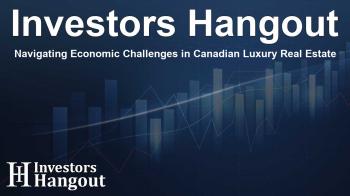Navigating Economic Challenges in Canadian Luxury Real Estate

Economic Challenges Impacting Luxury Real Estate
As the luxury housing market continues to evolve, various cities in Canada are facing economic pressures that are reshaping their real estate landscapes. The performance of luxury real estate has taken a noticeable turn, particularly evident in cities like Toronto and Vancouver, where economic uncertainty looms large.
Montreal and Calgary Stand Out
Interestingly, amidst these challenges, Montreal and Calgary have emerged as shining examples of resilience. Montreal's luxury real estate market recorded impressive growth in the first half of 2025, with residential sales exceeding $1 million surging by 26% compared to the previous year. Additionally, sales of homes valued over $4 million showcased a robust increase of 22% year-over-year.
Calgary's Balanced Market
Calgary's market, which previously experienced a seller's boom in 2024, has now shifted towards a more balanced state. The increase in residential sales over $1 million saw a modest gain of 3%. The continuous influx of residents and steady housing demand contributed significantly to this balance, indicating a sustainable market in the face of global challenges.
Luxury Market Trends in Major Cities
In stark contrast, the Greater Toronto Area (GTA) showcased a divergence in its luxury real estate market. While ultra-luxury sales (properties over $10 million) skyrocketed—recording a remarkable 200% increase from the previous year—the overall luxury sales faced a setback. Transactions for homes priced over $4 million dropped by 28%, highlighting a cooling market amidst rising inventory and shifting buyer sentiment.
Vancouver's Declining Sales
Vancouver also reported significant declines in its luxury sector. The first half of 2025 saw a staggering 51% decrease in sales for properties over $4 million. Notably, the market for ultra-luxury homes valued over $10 million recorded only two transactions, a substantial drop from the previous year’s seven sales. This trend indicates heightened caution among buyers in an unpredictable economic climate.
Investor Sentiment and Future Outlook
Despite these challenges, investor sentiment remains noticeably cautious yet hopeful. The luxury market, while facing short-term pressures, typically appeals to high-net-worth individuals who prioritize long-term investments. Experts suggest that the Canadian luxury real estate market could experience a slow recovery as consumer confidence gradually improves.
Effi Barak, President of Sotheby’s International Realty Canada, underscored the continued resilience in Montreal and Calgary, attributing it to more attainable housing prices, positive consumer sentiment, and the capacity for upward mobility in these markets. While the patterns in Toronto and Vancouver lean toward a buyer’s market, there is still demand in premium neighborhoods that attract discerning buyers.
Key Factors Affecting Luxury Sales
The landscape of luxury real estate is influenced by various factors, including inventory levels, consumer sentiment, mortgage rates, and macroeconomic conditions. Buyers in major cities often assess multiple variables before making a commitment. In recent months, inventory levels in metropolitan areas have risen significantly, providing more options for potential buyers, yet also intensifying competition among sellers.
Future Predictions
Looking ahead, experts predict that the demand for luxury homes will continue, albeit with caution. Factors such as employment rates, economic growth, and interest rate stability will heavily influence market activity. As Canadian cities navigate through potential economic uncertainties, luxury real estate may hold its ground as a stable investment choice for affluent buyers.
In conclusion, while some markets like Toronto and Vancouver grapple with challenges, Montreal and Calgary illustrate how resilience and adaptability within the luxury real estate sector can thrive amidst uncertainty. The luxury real estate landscape remains dynamic, and ongoing developments in the economy will undoubtedly shape its trajectory.
Frequently Asked Questions
What factors are currently impacting the luxury real estate market in Canada?
Economic uncertainty, rising inventory levels, and fluctuating consumer sentiment significantly affect the luxury real estate market in Canadian cities.
How did the luxury market perform in Montreal in the first half of 2025?
Montreal's luxury market outperformed expectations with residential sales over $1 million increasing by 26% year-over-year, reflecting strong buyer demand.
What is the outlook for the luxury housing market in Toronto?
The luxury housing market in Toronto is facing challenges, with a noted decline in transactions over $4 million, but an increase in ultra-luxury sales indicates some segments are performing well.
How is Calgary's luxury market performing compared to other major cities?
Calgary's luxury market remains balanced with a slight increase in sales, unlike Toronto and Vancouver, which are experiencing clearer downturns.
What are experts predicting for the future of luxury real estate in Canada?
Experts predict a cautious recovery in the luxury real estate market driven by high-net-worth individuals seeking long-term investments amidst ongoing economic adjustments.
About The Author
Contact Kelly Martin privately here. Or send an email with ATTN: Kelly Martin as the subject to contact@investorshangout.com.
About Investors Hangout
Investors Hangout is a leading online stock forum for financial discussion and learning, offering a wide range of free tools and resources. It draws in traders of all levels, who exchange market knowledge, investigate trading tactics, and keep an eye on industry developments in real time. Featuring financial articles, stock message boards, quotes, charts, company profiles, and live news updates. Through cooperative learning and a wealth of informational resources, it helps users from novices creating their first portfolios to experts honing their techniques. Join Investors Hangout today: https://investorshangout.com/
The content of this article is based on factual, publicly available information and does not represent legal, financial, or investment advice. Investors Hangout does not offer financial advice, and the author is not a licensed financial advisor. Consult a qualified advisor before making any financial or investment decisions based on this article. This article should not be considered advice to purchase, sell, or hold any securities or other investments. If any of the material provided here is inaccurate, please contact us for corrections.

